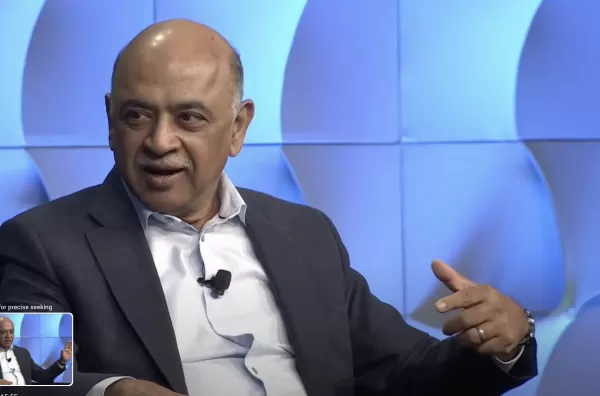IBM CEO urges the Trump administration to increase — not cut — federal AI R&D funding

IBM CEO Advocates for Stronger Federal AI Funding Amid Budget Cuts
Arvind Krishna, CEO of IBM, isn’t mincing words when it comes to federal funding for AI and emerging technologies. Unlike the Trump administration’s push for deep cuts to scientific research, Krishna argues that increased investment in R&D is crucial for America’s future.
“We’ve been extremely vocal—both as a company and personally—that federally funded R&D should be expanded, not reduced,” Krishna told TechCrunch in a recent interview. “Our stance is clear: More funding drives economic growth, strengthens U.S. competitiveness, and fuels essential technologies.”
Federal AI Research Under Threat
The Trump administration’s proposed 2026 budget seeks to gut funding for key science agencies, including the National Science Foundation (NSF), where cuts could eliminate billions in AI research grants. The Directorate for Technology, Innovation and Partnerships (TIP), a critical AI research hub, has already faced steep reductions. Meanwhile, staffing cuts at the NSF and National Institute of Standards and Technology (NIST) have raised alarms across the tech sector.
Even more concerning? The potential dismantling of the CHIPS Act, a Biden-era initiative that boosted domestic semiconductor production—including AI-critical chips. The office managing CHIPS Act funds was largely defunded in March.
Tech Industry Pushes Back
Industry leaders aren’t staying silent. Groups like the Software and Information Industry Association have warned White House officials that slashing R&D budgets could cripple America’s AI leadership. The numbers back them up: Federally funded research delivers annual returns of 25-40%, outperforming even top-tier venture capital funds (15-27%).
Krishna points out that federal R&D spending is near historic lows as a percentage of GDP. “More investment in AI, quantum computing, and semiconductors isn’t just beneficial—it’s essential for long-term competitiveness,” he said.
IBM Feels the Impact
The cuts have already hit IBM. The company disclosed in its Q1 earnings call that $100 million in federal contracts—representing 5-10% of its consulting business—were abruptly canceled. Still, Krishna remains cautiously optimistic.
“I expect federal R&D funding for AI, quantum, and chips to rebound within a year,” he said. “The U.S. can’t afford to fall behind.”
Exhibit at TechCrunch Sessions: AI
Showcase your innovation to 1,200+ decision-makers—without breaking the bank. Limited tables available until May 9.
Berkeley, CA | June 5 BOOK NOW
Related article
 US to Sanction Foreign Officials Over Social Media Regulations
US Takes Stand Against Global Digital Content Regulations
The State Department issued a sharp diplomatic rebuke this week targeting European digital governance policies, signaling escalating tensions over control of online platforms. Secretary Marco
US to Sanction Foreign Officials Over Social Media Regulations
US Takes Stand Against Global Digital Content Regulations
The State Department issued a sharp diplomatic rebuke this week targeting European digital governance policies, signaling escalating tensions over control of online platforms. Secretary Marco
 Anthropic Resolves Legal Case Over AI-Generated Book Piracy
Anthropic has reached a resolution in a significant copyright dispute with US authors, agreeing to a proposed class action settlement that avoids a potentially costly trial. The agreement, filed in court documents this Tuesday, stems from allegations
Anthropic Resolves Legal Case Over AI-Generated Book Piracy
Anthropic has reached a resolution in a significant copyright dispute with US authors, agreeing to a proposed class action settlement that avoids a potentially costly trial. The agreement, filed in court documents this Tuesday, stems from allegations
 TikTok's Ban Crisis Nears Resolution with Potential New App and Sale
TikTok Sale Nears Completion as New US Version Prepares for LaunchDespite the TikTok divest-or-ban legislation taking effect in January, the platform has maintained US operations with only a brief one-day shutdown. *The Information* now reports that
Comments (4)
0/200
TikTok's Ban Crisis Nears Resolution with Potential New App and Sale
TikTok Sale Nears Completion as New US Version Prepares for LaunchDespite the TikTok divest-or-ban legislation taking effect in January, the platform has maintained US operations with only a brief one-day shutdown. *The Information* now reports that
Comments (4)
0/200
![BenJackson]() BenJackson
BenJackson
 September 15, 2025 at 8:30:35 AM EDT
September 15, 2025 at 8:30:35 AM EDT
Interessante Position von IBM! 🤔 Aber wie realistisch ist es, dass eine Regierung, die grundsätzlich für Sparmaßnahmen steht, plötzlich mehr Geld in KI-Forschung steckt? Wirkt ein bisschen weltfremd... oder vielleicht nur PR?


 0
0
![RonaldMitchell]() RonaldMitchell
RonaldMitchell
 August 15, 2025 at 3:01:00 PM EDT
August 15, 2025 at 3:01:00 PM EDT
IBM's CEO is spot on! Boosting AI R&D funding is crucial for staying ahead in tech. Cutting budgets now is like selling your car to save on gas—short-sighted and risky. 🚀


 0
0
![LawrenceWilliams]() LawrenceWilliams
LawrenceWilliams
 August 4, 2025 at 7:00:59 AM EDT
August 4, 2025 at 7:00:59 AM EDT
IBM's CEO makes a bold case for boosting AI research funding—smart move! Cutting budgets now is like starving a rocket before launch. AI’s potential is massive, but without federal support, we’re risking a stall in progress. 🚀


 0
0
![RyanSanchez]() RyanSanchez
RyanSanchez
 July 27, 2025 at 9:20:54 PM EDT
July 27, 2025 at 9:20:54 PM EDT
IBM's CEO is spot on—slashing AI research funds is like cutting the oxygen to innovation. More investment means faster breakthroughs, and we can't afford to lag behind in this tech race! 🚀


 0
0

IBM CEO Advocates for Stronger Federal AI Funding Amid Budget Cuts
Arvind Krishna, CEO of IBM, isn’t mincing words when it comes to federal funding for AI and emerging technologies. Unlike the Trump administration’s push for deep cuts to scientific research, Krishna argues that increased investment in R&D is crucial for America’s future.
“We’ve been extremely vocal—both as a company and personally—that federally funded R&D should be expanded, not reduced,” Krishna told TechCrunch in a recent interview. “Our stance is clear: More funding drives economic growth, strengthens U.S. competitiveness, and fuels essential technologies.”
Federal AI Research Under Threat
The Trump administration’s proposed 2026 budget seeks to gut funding for key science agencies, including the National Science Foundation (NSF), where cuts could eliminate billions in AI research grants. The Directorate for Technology, Innovation and Partnerships (TIP), a critical AI research hub, has already faced steep reductions. Meanwhile, staffing cuts at the NSF and National Institute of Standards and Technology (NIST) have raised alarms across the tech sector.
Even more concerning? The potential dismantling of the CHIPS Act, a Biden-era initiative that boosted domestic semiconductor production—including AI-critical chips. The office managing CHIPS Act funds was largely defunded in March.
Tech Industry Pushes Back
Industry leaders aren’t staying silent. Groups like the Software and Information Industry Association have warned White House officials that slashing R&D budgets could cripple America’s AI leadership. The numbers back them up: Federally funded research delivers annual returns of 25-40%, outperforming even top-tier venture capital funds (15-27%).
Krishna points out that federal R&D spending is near historic lows as a percentage of GDP. “More investment in AI, quantum computing, and semiconductors isn’t just beneficial—it’s essential for long-term competitiveness,” he said.
IBM Feels the Impact
The cuts have already hit IBM. The company disclosed in its Q1 earnings call that $100 million in federal contracts—representing 5-10% of its consulting business—were abruptly canceled. Still, Krishna remains cautiously optimistic.
“I expect federal R&D funding for AI, quantum, and chips to rebound within a year,” he said. “The U.S. can’t afford to fall behind.”
Exhibit at TechCrunch Sessions: AI
Showcase your innovation to 1,200+ decision-makers—without breaking the bank. Limited tables available until May 9.
Berkeley, CA | June 5 BOOK NOW
 US to Sanction Foreign Officials Over Social Media Regulations
US Takes Stand Against Global Digital Content Regulations
The State Department issued a sharp diplomatic rebuke this week targeting European digital governance policies, signaling escalating tensions over control of online platforms. Secretary Marco
US to Sanction Foreign Officials Over Social Media Regulations
US Takes Stand Against Global Digital Content Regulations
The State Department issued a sharp diplomatic rebuke this week targeting European digital governance policies, signaling escalating tensions over control of online platforms. Secretary Marco
 Anthropic Resolves Legal Case Over AI-Generated Book Piracy
Anthropic has reached a resolution in a significant copyright dispute with US authors, agreeing to a proposed class action settlement that avoids a potentially costly trial. The agreement, filed in court documents this Tuesday, stems from allegations
Anthropic Resolves Legal Case Over AI-Generated Book Piracy
Anthropic has reached a resolution in a significant copyright dispute with US authors, agreeing to a proposed class action settlement that avoids a potentially costly trial. The agreement, filed in court documents this Tuesday, stems from allegations
 TikTok's Ban Crisis Nears Resolution with Potential New App and Sale
TikTok Sale Nears Completion as New US Version Prepares for LaunchDespite the TikTok divest-or-ban legislation taking effect in January, the platform has maintained US operations with only a brief one-day shutdown. *The Information* now reports that
TikTok's Ban Crisis Nears Resolution with Potential New App and Sale
TikTok Sale Nears Completion as New US Version Prepares for LaunchDespite the TikTok divest-or-ban legislation taking effect in January, the platform has maintained US operations with only a brief one-day shutdown. *The Information* now reports that
 September 15, 2025 at 8:30:35 AM EDT
September 15, 2025 at 8:30:35 AM EDT
Interessante Position von IBM! 🤔 Aber wie realistisch ist es, dass eine Regierung, die grundsätzlich für Sparmaßnahmen steht, plötzlich mehr Geld in KI-Forschung steckt? Wirkt ein bisschen weltfremd... oder vielleicht nur PR?


 0
0
 August 15, 2025 at 3:01:00 PM EDT
August 15, 2025 at 3:01:00 PM EDT
IBM's CEO is spot on! Boosting AI R&D funding is crucial for staying ahead in tech. Cutting budgets now is like selling your car to save on gas—short-sighted and risky. 🚀


 0
0
 August 4, 2025 at 7:00:59 AM EDT
August 4, 2025 at 7:00:59 AM EDT
IBM's CEO makes a bold case for boosting AI research funding—smart move! Cutting budgets now is like starving a rocket before launch. AI’s potential is massive, but without federal support, we’re risking a stall in progress. 🚀


 0
0
 July 27, 2025 at 9:20:54 PM EDT
July 27, 2025 at 9:20:54 PM EDT
IBM's CEO is spot on—slashing AI research funds is like cutting the oxygen to innovation. More investment means faster breakthroughs, and we can't afford to lag behind in this tech race! 🚀


 0
0





























